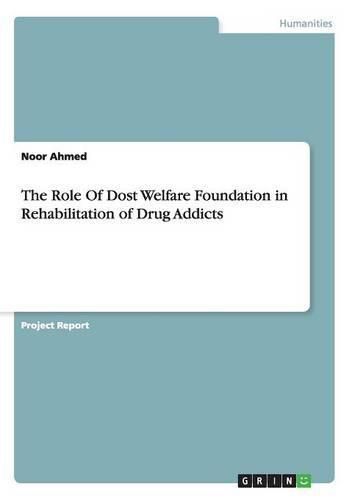Readings Newsletter
Become a Readings Member to make your shopping experience even easier.
Sign in or sign up for free!
You’re not far away from qualifying for FREE standard shipping within Australia
You’ve qualified for FREE standard shipping within Australia
The cart is loading…






Project Report from the year 2012 in the subject Sociology - Medical Care, grade: A, University of Peshawar (Institute of Social Work, Sociology and Gender Studies), language: English, abstract: Man’s desire to employ substances that provide pleasurable stimulation or narcotic effects upon the central nervous system has been expressed universally in ancient as well as in modern civilization. With the passage of time excessive indulgence in them came to be considering as deprived or criminal behavior. In recent years, however, it has been recognized that drug addiction is a psychiatric and social problem. The very word drug means different things for different people. For some people, drugs are those substances which are illegal and socially disapproved of, associated with stereotypes images of junkies or solvent snuffers, and not everyday substances that ordinary people use. On other hand many people increasingly refer to all medicinal preparations as drugs. A drug, broadly speaking, is any substance that, when absorbed into the body of a living organism, alters normal bodily function (World Health Organization, 1969). In pharmacology, a drug is a chemical substance used in the treatment, cure, prevention, or diagnosis of disease or used to otherwise enhance physical or mental well-being (Middle English Drogges, 2007). Addiction is a chronic, often relapsing, brain disease that causes compulsive drug seeking and use, despite harmful consequences to the addicted individual and to those around them. Although the initial decision to take drugs is voluntary for most people, the brain changes that occur over time challenge a person’s self-control and ability to resist intense impulses urging them to take drugs (National Institute on Drug Abuse, 2011).
$9.00 standard shipping within Australia
FREE standard shipping within Australia for orders over $100.00
Express & International shipping calculated at checkout
Project Report from the year 2012 in the subject Sociology - Medical Care, grade: A, University of Peshawar (Institute of Social Work, Sociology and Gender Studies), language: English, abstract: Man’s desire to employ substances that provide pleasurable stimulation or narcotic effects upon the central nervous system has been expressed universally in ancient as well as in modern civilization. With the passage of time excessive indulgence in them came to be considering as deprived or criminal behavior. In recent years, however, it has been recognized that drug addiction is a psychiatric and social problem. The very word drug means different things for different people. For some people, drugs are those substances which are illegal and socially disapproved of, associated with stereotypes images of junkies or solvent snuffers, and not everyday substances that ordinary people use. On other hand many people increasingly refer to all medicinal preparations as drugs. A drug, broadly speaking, is any substance that, when absorbed into the body of a living organism, alters normal bodily function (World Health Organization, 1969). In pharmacology, a drug is a chemical substance used in the treatment, cure, prevention, or diagnosis of disease or used to otherwise enhance physical or mental well-being (Middle English Drogges, 2007). Addiction is a chronic, often relapsing, brain disease that causes compulsive drug seeking and use, despite harmful consequences to the addicted individual and to those around them. Although the initial decision to take drugs is voluntary for most people, the brain changes that occur over time challenge a person’s self-control and ability to resist intense impulses urging them to take drugs (National Institute on Drug Abuse, 2011).